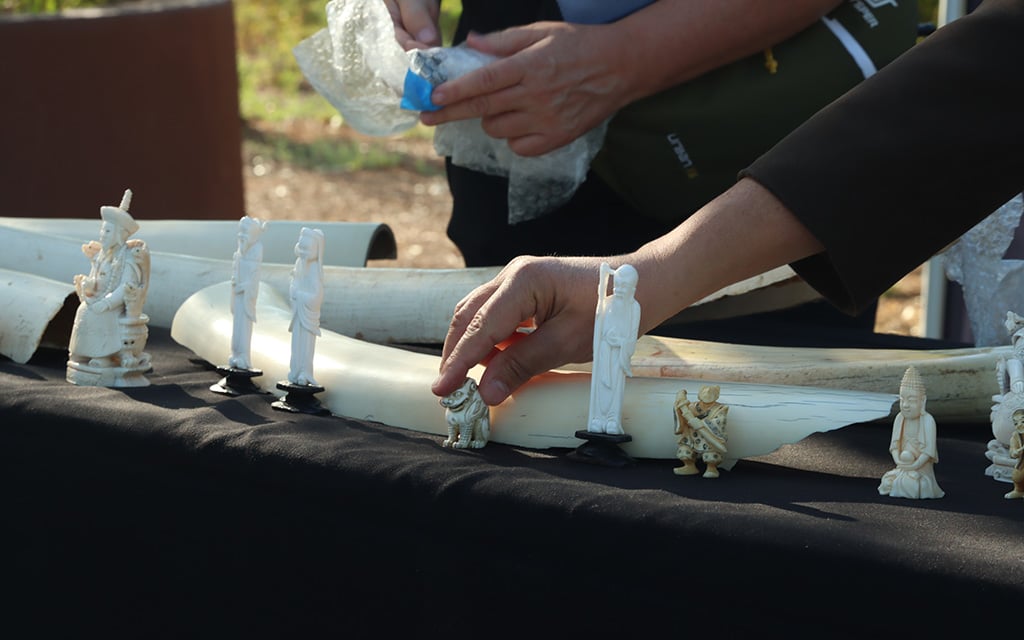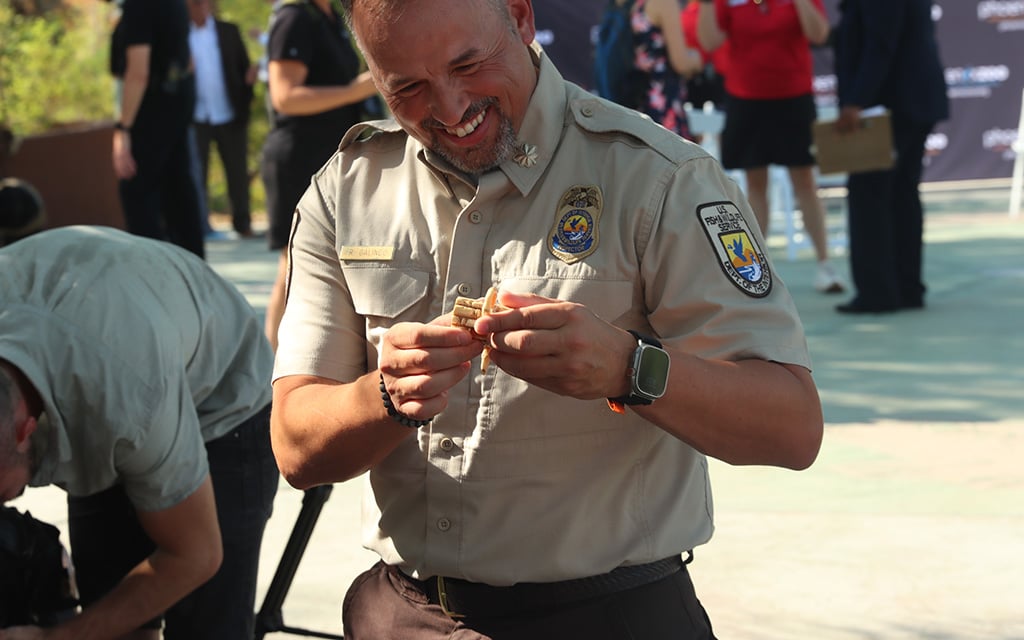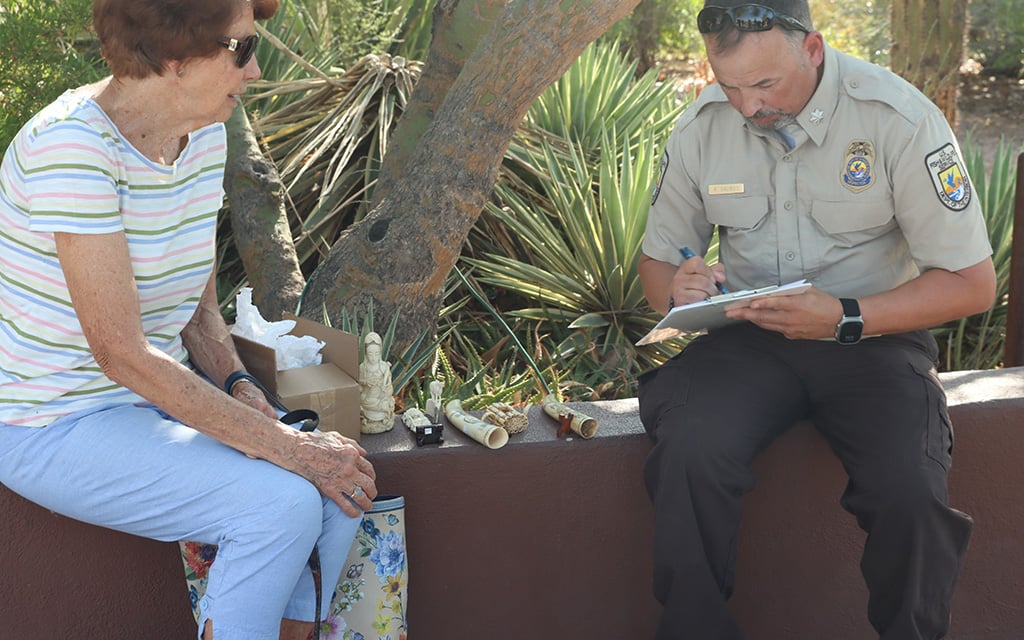
Phoenix Zoo staff members set up a display of ivory tusks and trinkets to educate the public on ivory poaching during the “Toss the Tusk” event in Phoenix on Sept. 27, 2024. (Photo by Aryton Temcio/Cronkite News)
PHOENIX – Since 1989, the international commercial trade of ivory has been banned in an effort to rebuild the dwindling population of elephants and other species poached for their ivory. Although these animals are found primarily in Africa and Asia, many agencies think the ramifications of ivory poaching are felt around the world.
The United States only adopted a near-total ban in 2016. Despite the bans on commercial trading, ivory is still legal to possess in the U.S., and many people still do.
“Toss the Tusk,” an event organized by The Association of Zoos and Aquariums’ Wildlife Trafficking Alliance and the U.S. Fish & Wildlife Service, aims to educate the American public on the severity of ivory poaching and illegal ivory trade at zoos across the United States.
“The challenges with ivory are mostly that for centuries ivory has been commercially traded. So it’s amazing how many products contain ivory, from bracelets, necklaces, trinkets that you would display on your bookcases,” said Dan Ashe, president and CEO of the Association of Zoos and Aquariums, or AZA.
At Toss the Tusk, the public is encouraged to surrender ivory to help in the conservation and education efforts. The AZA and the USFWS have rotated Toss the Tusk events to AZA-accredited zoos throughout the U.S. and have held eight events from 2019 to 2021. No events were held in 2020 due to the COVID-19 pandemic.
This is the first time Toss the Tusk has made a stop at the Phoenix Zoo, one of five AZA-accredited organizations in Arizona, to show the public how to help combat the illegal ivory trade. Experts believe by taking the current ivory out of rotation, the market for these products will decrease, lowering the incentive for ivory poaching.
“They can make a difference,” Ashe said. “Individual consumer decisions are what is driving the business, the illegal business in wildlife products. So I want them to understand that consumers – individual consumers – can make a difference.”
The journey for surrendered ivory does not end at the event. After the USFWS takes possession of the ivory, it is transported to the National Wildlife Property Repository in Colorado to help with research, education and training.

Rene Galindo, an inspector with the U.S. Fish & Wildlife Service, inspects a piece of ivory surrendered at the “Toss the Tusk” event at the Phoenix Zoo on Sept. 27, 2024. (Photo by Aryton Temcio/Cronkite News)
“If you’re interested in giving away, don’t want that item anymore or you don’t have anyone to hand it down to, call our office,” said Rene Galindo, a wildlife inspector for USFWS. “We will be happy to take it off your hands and then we’ll send it to our repository, it will be used for education or outreach.”
Conservation efforts surrounding ivory is something the Phoenix Zoo does year-round with the help of its Asian elephant, Indu.
“A lot of the items that people have are things that have been passed on from family members, so it’s really educating the public about her (Indu),” said Stevie Merner, a senior elephant keeper at Phoenix Zoo. “Indu is a great ambassador for her species, and we are able to reach a lot of people in Phoenix and around the surrounding states. We are able to educate them more because she is here.”
With great turnout at Toss the Tusk events in previous years, USFWS officials said the zoo could help them take advantage of the unique opportunities in Arizona.
“As home to several border towns and major ports of entries for travelers abroad, Arizona sees high numbers of illegal wildlife products,” said Victoria Owens, a USFWS special agent. “Despite the complexities of tackling wildlife and ivory trafficking, our collaborative efforts yield significant results.”
The Phoenix Zoo had 50 items containing ivory surrendered during its Toss the Tusk event, and over 500 zoo guests visited educational booths set up in front of the entrance.
“I had some pieces of ivory that had belonged to an estate my husband was the executor of, and when I had the Asian art part of that estate appraised, the appraiser said that he suspected that this was ivory and that you can’t sell it,” said Elizabeth Schneider, a Phoenix resident who surrendered ivory items at the event. “I saw the event on the zoo’s website in my email and I said, ‘Hallelujah, this is where the ivory is going.’”

Phoenix resident Elizabeth Schneider sits with wildlife inspector Rene Galindo as they process Schneider’s surrendered ivory at the Phoenix Zoo on Sept. 27, 2024. (Photo by Aryton Temcio/Cronkite News)
The AZA and the USFWS want people who have obtained ivory legally to have an easy way to surrender it.
“The gentleman … confirmed that they were ivory. He said that he would take them. He gave me this form to fill out, which has my name, my address, and I signed it,” Schneider said. “It couldn’t have been simpler.”
For some people, surrendering ivory can mean relinquishing a family heirloom that has been passed down for generations. The AZA and its zoos keep this in mind when preparing for a Toss the Tusk event.
“We actually set up a little place where you can sit down and have a cup of tea and tell your story, or you could just drive through, if you want, and do a dropoff out of your car, but if you also wanted, you could come in and have a seat and just tell a very open ear with no judgment the story behind that,” said Amy Gotliffe, vice president of conservation at the Oakland Zoo.
The Oakland Zoo, in collaboration with the AZA and USFWS, held a Toss the Tusk event in September 2023 and saw over 400 items containing animal parts, including ivory, surrendered.
“We heard so many stories,” Gotliffe said. “People would be emotional, but they’d also be so deeply grateful that they found the right home for it.”
The illegal poaching of ivory has decreased the number of elephants and other animals with ivory living in the wild. According to the International Union for Conservation of Nature’s Red List of Threatened Species, all species of elephants are currently endangered or critically endangered, with population trends still decreasing.
“It doesn’t belong on our bookshelves or on our wrists or on our coffee tables. Ivory belongs to living elephants, like the elephants that you can see at great zoos like the Phoenix Zoo,” Ashe said. “So, by saying no to trade in ivory, we’re saying yes to a world where our children and grandchildren will continue to be able to see and witness these magnificent inspiring creatures.”
